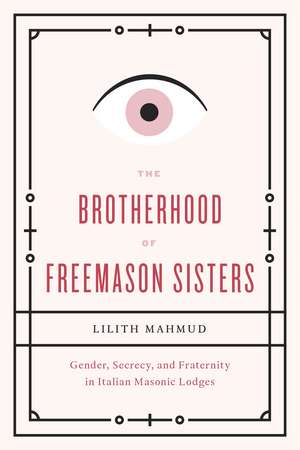The Brotherhood of Freemason Sisters: Gender, Secrecy, and Fraternity in Italian Masonic Lodges
Autor Lilith Mahmuden Limba Engleză Paperback – 3 apr 2014
From its traces in cryptic images on the dollar bill to Dan Brown’s The Lost Symbol, Freemasonry has long been one of the most romanticized secret societies in the world. But a simple fact escapes most depictions of this elite brotherhood: There are women Freemasons, too. In this groundbreaking ethnography, Lilith Mahmud takes readers inside Masonic lodges in contemporary Italy, where she observes the many ritualistic and fraternal bonds forged among women initiates of this elite and esoteric society.
Offering a tantalizing look behind lodge doors, The Brotherhood of Freemason Sisters unveils a complex culture of discretion in which Freemasons simultaneously reveal some truths and hide others. Women—one of Freemasonry’s best-kept secrets—are often upper class and highly educated but paradoxically antifeminist, and their self-cultivation through the Masonic path is an effort to embrace the deeply gendered ideals of fraternity. Mahmud unravels this contradiction at the heart of Freemasonry: how it was at once responsible for many of the egalitarian concepts of the Enlightenment and yet has always been, and in Italy still remains, extremely exclusive. The result is not only a thrilling look at an unfamiliar—and surprisingly influential—world, but a reevaluation altogether of the modern values and ideals that we now take for granted.
Offering a tantalizing look behind lodge doors, The Brotherhood of Freemason Sisters unveils a complex culture of discretion in which Freemasons simultaneously reveal some truths and hide others. Women—one of Freemasonry’s best-kept secrets—are often upper class and highly educated but paradoxically antifeminist, and their self-cultivation through the Masonic path is an effort to embrace the deeply gendered ideals of fraternity. Mahmud unravels this contradiction at the heart of Freemasonry: how it was at once responsible for many of the egalitarian concepts of the Enlightenment and yet has always been, and in Italy still remains, extremely exclusive. The result is not only a thrilling look at an unfamiliar—and surprisingly influential—world, but a reevaluation altogether of the modern values and ideals that we now take for granted.
Preț: 174.34 lei
Preț vechi: 215.08 lei
-19% Nou
Puncte Express: 262
Preț estimativ în valută:
33.38€ • 34.44$ • 27.67£
33.38€ • 34.44$ • 27.67£
Carte indisponibilă temporar
Doresc să fiu notificat când acest titlu va fi disponibil:
Se trimite...
Preluare comenzi: 021 569.72.76
Specificații
ISBN-13: 9780226095868
ISBN-10: 022609586X
Pagini: 256
Ilustrații: 1 halftone
Dimensiuni: 152 x 229 x 25 mm
Greutate: 0.39 kg
Editura: University of Chicago Press
Colecția University of Chicago Press
ISBN-10: 022609586X
Pagini: 256
Ilustrații: 1 halftone
Dimensiuni: 152 x 229 x 25 mm
Greutate: 0.39 kg
Editura: University of Chicago Press
Colecția University of Chicago Press
Notă biografică
Lilith Mahmud is associate professor of gender & sexuality studies and anthropology at the University of California, Irvine.
Cuprins
Acknowledgments
Introduction to the Path
Chapter One: Spaces of Discretion
Password I
Chapter Two: Initiations
Chapter Three: Brotherly Love
Password II
Chapter Four: Speculative Labor
Password III
Chapter Five: Transparent Conspiracies
Coda: A Profanation
Notes
Works Cited
Index
Recenzii
“Like all the best ethnographies, Brotherhood of Freemason Sisters inspires curiosity that increases, rather than diminishes, with the reader’s growing sense of discernment.”
“I commend this book not only for academic purposes but for anyone seeking a broader understanding of elites. With her bold ethnography, Mahmud delivers an admirable contribution to a growing literature of provincializing Europe and questioning its normative centrality to discourses presumed to have travelled to other locales. Above all this is a further critique of a tendency to discard ‘ethnographic subjects’ as not poor enough, not suffering enough, not being marginal enough. By asking ‘What about the unsympathetic subjects of ethnographic studies, whose right-wing or religious views on gender, class, race, sexuality, labor, nationalism, or the military, for instance might push anthropologists to the limits of our own cultural relativism,’ I take it to be part of a wider question contemporary anthropology faces, the ‘hierarchization’ of worthy ethnographic subjects. Mahmud takes a bold stance in answering this question by opening up the conditions of research and delivering a deeply humanistic and attractive ethnography about one of the most powerful global fraternities.”
“In The Brotherhood of Freemason Sisters, Mahmud takes the reader on a journey of discovery that mirrors both her fieldwork experience and the initiation path of the Masons she studies. Her writing is clear and inviting, creating a sense of rapport with the reader as she transitions effortlessly from passages of descriptive narrative, to analysis and theoretical discussion, then personal reflection.”
“The Brotherhood of Freemason Sisters: Gender, Secrecy, and Fraternity in Italian Masonic Lodges is getting accolades, and I can see why. In Mahmud’s careful hands, this study of gendered elite becomes one of subtleties and contradictions. While she traces how fraternity as an ‘intentional project’ reifies power differentials in practice, she never lets go of the belief that fraternity is in itself the ‘heart of humanism.’ Freemason lodges may very well be gendered, racialized, and class-based organizations, but Mahmud reminds us that the pursuit of fraternity is nonetheless a ‘profound source of meaning and purpose’ for us all.”
“In her brilliant ethnographic exegesis, Mahmud. . . persuasively links what appear to be the idiosyncratic predicaments of Freemason sisters to countless actors who have struggled and who continue to struggle in the great and small movements that punctuate the history of liberalism.”
